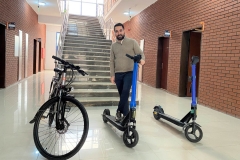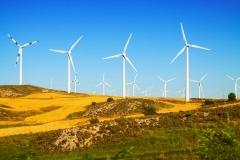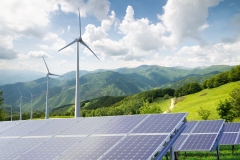
GRADUATE SCHOOL
Sustainable Energy (Without Thesis)
SEN 556 | Course Introduction and Application Information
| Course Name |
Great Powers and Global Energy Politics
|
|
Code
|
Semester
|
Theory
(hour/week) |
Application/Lab
(hour/week) |
Local Credits
|
ECTS
|
|
SEN 556
|
Fall/Spring
|
3
|
0
|
3
|
7.5
|
| Prerequisites |
None
|
|||||
| Course Language |
English
|
|||||
| Course Type |
Elective
|
|||||
| Course Level |
Second Cycle
|
|||||
| Mode of Delivery | - | |||||
| Teaching Methods and Techniques of the Course | - | |||||
| Course Coordinator | ||||||
| Course Lecturer(s) | - | |||||
| Assistant(s) | - | |||||
| Course Objectives | This course aims at providing an overview of how the pursuit, production, and protection of energy resources shapes the grand strategies of Great Powers since the dawn of Industrial Age. Topics that will be discussed include how the production and control of coal reserves shape British, French and German grand strategies in 19th century and how oil replaces coal as the strategic energy resource towards the end 19th century. Relations between Great Powers in the 20th century is examined from the perspective of control of energy resources and particular attention will be given the role it plays in Great Power conflicts such as both World Wars. Contemporary Great Power strategies in the 21st century and how they are shaped by concerns over the control of scarce energy resources and what the future could bring as the world slowly shifts away from fosil fuels will also be an important part of the course. |
| Learning Outcomes |
The students who succeeded in this course;
|
| Course Description | This course aims at providing an overview of how the pursuit, production, and protection of energy resources shapes the grand strategies of Great Powers since the dawn of Industrial Age. |
|
|
Core Courses | |
| Major Area Courses | ||
| Supportive Courses | ||
| Media and Management Skills Courses | ||
| Transferable Skill Courses |
WEEKLY SUBJECTS AND RELATED PREPARATION STUDIES
| Week | Subjects | Related Preparation |
| 1 | Introduction | |
| 2 | What is grand strategy? | Daniel Yergin, The Prize: the Epic Quest for Oil, Money, & Power, Free Press, 1993, 9780671799328 |
| 3 | Understanding the link between grand strategy and energy resources | Daniel Yergin, The Prize: the Epic Quest for Oil, Money, & Power, Free Press, 1993, 9780671799328 |
| 4 | Great Powers and the Struggle for Energy Resources in the 19th Century I | Daniel Yergin, The Prize: the Epic Quest for Oil, Money, & Power, Free Press, 1993, 9780671799328 |
| 5 | Great Powers and the Struggle for Energy Resources in the 19th Century II | Daniel Yergin, The Prize: the Epic Quest for Oil, Money, & Power, Free Press, 1993, 9780671799328 |
| 6 | First Paper Due | Daniel Yergin, The Prize: the Epic Quest for Oil, Money, & Power, Free Press, 1993, 9780671799328 |
| 7 | The Coming of the Oil Age | Daniel Yergin, The Prize: the Epic Quest for Oil, Money, & Power, Free Press, 1993, 9780671799328 |
| 8 | Great Powers and the Struggle for Energy Resources in the 20th Century 1 | Daniel Yergin, The Prize: the Epic Quest for Oil, Money, & Power, Free Press, 1993, 9780671799328 |
| 9 | Great Powers and the Struggle for Energy Resources in the 20th Century 2 | Daniel Yergin, The Prize: the Epic Quest for Oil, Money, & Power, Free Press, 1993, 9780671799328 |
| 10 | Second Paper due | Daniel Yergin, The Prize: the Epic Quest for Oil, Money, & Power, Free Press, 1993, 9780671799328 |
| 11 | Great Power Strategies Today: A Contemporary Assessment – 1 | Daniel Yergin, The Prize: the Epic Quest for Oil, Money, & Power, Free Press, 1993, 9780671799328 |
| 12 | Great Power Strategies Today: A Contemporary Assessment – 2 | Daniel Yergin, The Prize: the Epic Quest for Oil, Money, & Power, Free Press, 1993, 9780671799328 |
| 13 | What is Next? Great Powers and Energy Politics in the 21st Century | Daniel Yergin, The Prize: the Epic Quest for Oil, Money, & Power, Free Press, 1993, 9780671799328 |
| 14 | Review | Daniel Yergin, The Prize: the Epic Quest for Oil, Money, & Power, Free Press, 1993, 9780671799328 |
| 15 | Third Paper due | |
| 16 | Review of the Semester |
| Course Notes/Textbooks | Parts from book that mentioned above and PowerPoint presentations |
| Suggested Readings/Materials | Imperatives, Basic Books, 1998, 9780465027262Zbigniew Brzezinski, The Grand Chessboard: American Primacy And Its Geostrategic |
EVALUATION SYSTEM
| Semester Activities | Number | Weigthing |
| Participation |
12
|
25
|
| Laboratory / Application | ||
| Field Work | ||
| Quizzes / Studio Critiques | ||
| Portfolio | ||
| Homework / Assignments |
3
|
75
|
| Presentation / Jury | ||
| Project | ||
| Seminar / Workshop | ||
| Oral Exams | ||
| Midterm | ||
| Final Exam | ||
| Total |
| Weighting of Semester Activities on the Final Grade |
100
|
|
| Weighting of End-of-Semester Activities on the Final Grade | ||
| Total |
ECTS / WORKLOAD TABLE
| Semester Activities | Number | Duration (Hours) | Workload |
|---|---|---|---|
| Theoretical Course Hours (Including exam week: 16 x total hours) |
16
|
3
|
48
|
| Laboratory / Application Hours (Including exam week: '.16.' x total hours) |
16
|
0
|
|
| Study Hours Out of Class |
15
|
4
|
60
|
| Field Work |
0
|
||
| Quizzes / Studio Critiques |
0
|
||
| Portfolio |
0
|
||
| Homework / Assignments |
3
|
39
|
117
|
| Presentation / Jury |
0
|
||
| Project |
0
|
||
| Seminar / Workshop |
0
|
||
| Oral Exam |
0
|
||
| Midterms |
0
|
||
| Final Exam |
0
|
||
| Total |
225
|
COURSE LEARNING OUTCOMES AND PROGRAM QUALIFICATIONS RELATIONSHIP
|
#
|
Program Competencies/Outcomes |
* Contribution Level
|
||||
|
1
|
2
|
3
|
4
|
5
|
||
| 1 | To improve theoretical and conceptual proficiencies as well as applied competencies on energy studies. | |||||
| 2 | To evaluate the problems and circumstances about energy systems by using theoretical and practical knowledge in fundamental disciplines of energy studies such as economics, natural sciences, political science, law, and sociology. | |||||
| 3 | To analyze multi-dimensional problems which are faced and unpredicted in energy system by taking over responsibility as an individual and a group member. | |||||
| 4 | To evaluate the relationships between factors in energy policies and applications such as structures, markets, institutions, regulations, climate change and environment in a critical perspective. | |||||
| 5 | To debate problems in sustainable energy development by identifying them. | |||||
| 6 | To argue positive and negative aspects of international affairs and geopolitics on energy. | |||||
| 7 | To examine the economic and political structure that energy systems are based on. | |||||
| 8 | To question the theoretical and empirical gaps in energy studies literature by developing original arguments in order to fill these gaps in the literature. | |||||
| 9 | To interpret the collected data that would measure the theories, scenarios and concepts as variables by using scientific research methods in energy sciences and sustainable energy development field. | |||||
| 10 | To prepare an original thesis/term project about political, economic, environmental, social and/or historical dimensions of sustainable energy and geopolitics in accordance with scientific criteria. | |||||
| 11 | To develop foreign language skills to be able to follow the literature on energy studies and to communicate with international scholars. | |||||
| 12 | To be able to use data and information in advanced levels in the field of energy sciences. | |||||
| 13 | To have ethical, social and scientific values in the stages throughout the processes of collecting, interpreting, disseminating and implementing data relevant to energy studies. | |||||
*1 Lowest, 2 Low, 3 Average, 4 High, 5 Highest
NEWS |ALL NEWS

‘Double award’ for energy efficiency
Izmir University of Economics (IUE) received a double award at the ‘Innovative Idea Development Workshop in the Electricity Distribution Sector’ organized with

International investment for ‘Scootable’
Emrecan Durmaz, a student of Izmir University of Economics (IUE), who developed the software infrastructure that enables electric scooters and bicycles to

‘Social' analysis of energy’
Prof. Dr. Mehmet Efe Biresselioğlu from Izmir University of Economics (IUE) has implemented the ‘Cure’ project with 2 countries to measure the

